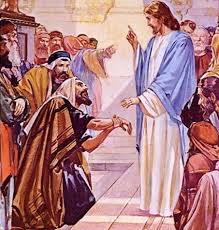Luke 1 – The Nazarene’s Commentary: Luke 1:26-38 – Gabriel’s Appearance to Mary
Luke 1:26-38 – Gabriel’s Appearance to Mary
LK1:26 Now in Elizabeth’s sixth month of pregnancy the angel Gabriel was sent from God to the village of Galilee called Nazareth, LK1:27 to a virgin[1] [Isaiah 7:14] promised in marriage to a man named Joseph of David’s House. And the name of the virgin was Mary.[2] LK1:28 Approaching Mary, Gabriel said to her: “Greetings, favored one! The LORD is with you!” LK1:29 At this statement Mary was very puzzled and kept wondering what this greeting meant. LK1:30 Then the angel Gabriel said to Mary: “Do not be frightened, Mary, for you have found favor with God. LK1:31 And, behold, you will conceive in your womb and will give birth to a son, and you will give him the name Jesus.[3] LK1:32 He will become a renowned person[4] and will be called a son of the Most High.[5] [Psalm 82:6] YHWH The God[6] will give to him David’s throne,[7] [Isaiah 9:7] LK1:33 and he will reign over Jacob’s House throughout the Ages. There will never be an end to his kingdom.” [Daniel 2:44] LK1:34 But in response Mary said to the angel Gabriel: “How can this be[8] since I have never known a man?” LK1:35 So the angel answered her: “Holy Pneuma[9] will come over you and the Most High’s power will overshadow you. As a result the One to be born will be also called Holy, God’s Son.[10] [Psalm 89:26] LK1:36 Now, look, your relative Elizabeth has also conceived a son in her old age and this is now the sixth month of her so-called barrenness. LK1:37 For no message from God is impossible.”[11] [Genesis 18:14] LK1:38 Then Mary said: “Look, YHWH’s slave![12] May it all take place with me just as you say!” And the angel Gabriel left her.
*
[1] Virgin: Possibly borrowed from Isaiah 7:14 where a PARTHENON is foretold. For details see notes in Nazarene Commentary 2000 on Matthew 1:23.
[2] Mary: For details see notes in Nazarene Commentary 2000 on Matthew.
[3] Jesus: The traditional form of the Greek IESOUS here. The Hebrew form is Yeshua and means “Yehowah is Salvation.” It is the same as the name Joshua. Some argue over the exact form. Accents in pronunciation of foreign languages persist no matter the tongue. It seems unreasonable to many that God would insist every word translated from the Hebrew Bible must be spoken in a Hebrew accent. Even the accents of Jews differed in the 1st Century just as they do in English and Spanish in different places.
[4] Renowned person: Or, great.
[5] A son of the Most High: Or, [the] Most High’s Son, Son of the Highest, Son of the Most High. The Greek is HUIOS YPSISTOU with the article. Compare a similar phrase at Psalm 82:6.
[6] YHWH The God: The Greek is KYRIOS HO THEOS without the article and may indicate the Tetragram originally occurred here.
[7] David’s throne: An echo of Isaiah 9:7. Compare also 2 Samuel 7:12; Psalm 132:11; Jeremiah 23:5.
[8] How can this be: Note Mary is not rebuked for her question while Zechariah was.
[9] Holy Pneuma: Or, holy spirit. Note the Pneuma is paralleled with God’s “power.” For details see notes in Nazarene Commentary 2000 on Holy Pneuma; compare 1 Corinthians 2:16.
[10] God’s Son: Or, the Son of God. The Greek is HUIOS THEOU with the article. Compare Psalm 2:7; 89:26.
[11] For no message from God is impossible: Or, word, declaration. It echoes Genesis 18:14. [Psalm 115:3]
[12] YHWH’s slave: Or, handmaid. The Greek is DOULE KYRIOU.
+
Preceding
Luke – The Nazarene’s Commentary: Introduction to the Third Gospel
Luke 1 – The Nazarene’s Commentary: Luke 1:1-4 – A Factual and Logical Statement
Luke 1 – The Nazarene’s Commentary: Luke 1:5-7 – Zechariah and Elizabeth
Luke 1 – The Nazarene’s Commentary: Luke 1:8-17 – An Angel Appears to a Priest
Luke 1 – The Nazarene’s Commentary: Luke 1:18-22 – Struck Dumb For Disbelief
Luke 1 – The Nazarene’s Commentary: Luke 1:23-25 – Elizabeth Pregnant


 [5]
[5]




 Bijbelvorsers Webs
Bijbelvorsers Webs Belgische Vrije Christadelphians / Belgian Free Christadelphians – Old Google Main Website
Belgische Vrije Christadelphians / Belgian Free Christadelphians – Old Google Main Website Christadelphian Ecclesia
Christadelphian Ecclesia Hoop tot Leven – Redding in Christus
Hoop tot Leven – Redding in Christus
Recent Comments